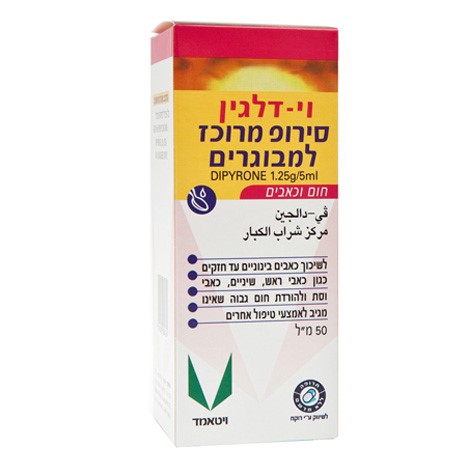Quest for the right Drug

וי-דלגין סירופ מרוכז למבוגרים V-DALGIN CONCENTRATED SYRUP FOR ADULTS (DIPYRONE)
תרופה במרשם
תרופה בסל
נרקוטיקה
ציטוטוקסיקה
צורת מתן:
פומי : PER OS
צורת מינון:
סירופ : SYRUP
עלון לרופא
מינוניםPosology התוויות
Indications תופעות לוואי
Adverse reactions התוויות נגד
Contraindications אינטראקציות
Interactions מינון יתר
Overdose הריון/הנקה
Pregnancy & Lactation אוכלוסיות מיוחדות
Special populations תכונות פרמקולוגיות
Pharmacological properties מידע רוקחי
Pharmaceutical particulars אזהרת שימוש
Special Warning עלון לרופא
Physicians Leaflet
Adverse reactions : תופעות לוואי
4.8 Undesirable effects The indication of frequency of undesirable effects is based on the following categories: Very common (≥1/10) Common (≥ 1/100, < 1/10) Uncommon (≥ 1/1,000, < 1/100) Rare (≥ 1/10,000, < 1/1,000) Very rare (< 1/10,000) Not known (the frequency cannot be estimated based on available data) Diseases of the blood and the lymphatic system Rare: Leukopenia. Very rare: Agranulocytosis (including cases with fatal outcome), thrombocytopenia. Not known: Aplastic anemia, pancytopenia (including cases with fatal outcome). These reactions can also occur if Dipyrone was previously given without any complications. There are individual indications according to which the risk of agranulocytosis might be increased if this medicinal product is used for more than a week. This reaction does not depend on the dose and might occur at any time of treatment. It manifests itself in high fever, chills, sore throat, difficulties when swallowing and inflammation in the region of the mouth, nose, throat and genital or anal region. However, these signs can be minimal in patients receiving antibiotics. Lymph node or splenic swelling is mild or not present at all. The blood sedimentation is significantly accelerated, the granulocytes are significantly reduced or are not present at all. Generally, but not always, normal values are found for hemoglobin, erythrocytes and thrombocytes (see section 4.4). Immediate discontinuation is essential for healing. We therefore strongly recommend discontinuing this medicinal product immediately and not deferring until the results of the laboratory tests are available, if there is an unexpected deterioration of the general condition, fever does not cease or occurs newly or painful mucosal swellings occur (in particular in the region of the mouth, nose and throat occur). Typical signs of thrombocytopenia include increased tendency to bleeding and petechiae on the skin and the mucous membranes. If pancytopenia occurs, treatment must be stopped immediately, and the full blood count must be monitored until it has normalized (see section 4.4). Immune system disorders Rare: Anaphylactoid or anaphylactic reactions*. Very rare: Analgesic induced asthma syndrome. Intolerability reactions manifest themselves typically in the form of asthma attacks in patients with analgesic induced asthma syndrome. Not known: Anaphylactic shock*. * These reactions might in particular occur after parenteral application, they might be serious and life- threatening, and in some cases even have a fatal outcome. They might also occur if Dipyrone was previously administered without any complications. Such reactions might develop directly after administration, or hours later. However, they occur predominantly during the first hour after administration. Milder reactions manifest themselves typically in the form of skin and mucous membrane reactions (such as itching, burning sensation, reddening, urticaria, swellings), dyspnea and (in rare cases) gastrointestinal symptoms. Such mild reactions might develop into more severe forms with generalized urticaria, severe angioedema (also in the laryngeal region), severe bronchospasm, cardiac arrhythmias, hypotension (sometimes with preceding hypertension) and circulatory shock. This medicinal product must therefore be discontinued immediately in the event of skin reactions. Cardiac diseases: Not known: Kounis syndrome. Vascular diseases: Uncommon: Hypotensive reactions during or after application, which are probably of pharmacological origin and not accompanied by other signs of an anaphylactoid or anaphylactic reaction. Such a reaction might lead to a severe hypotension. Dose-dependent critical hypotension may also occur in the event of hyperpyrexia, without further signs of hypersensitivity. Gastrointestinal disorders Not known: Cases of gastrointestinal bleeding were reported. Hepatobiliary disorders Not known: Drug-induced liver damage, including acute hepatitis, jaundice, increased liver enzymes (see section 4.4). Skin and subcutaneous skin disorders Uncommon: Fixed drug eruption. Rare: Rash (e.g. maculopapular exanthema). Very rare: Stevens-Johnson syndrome (SJS) or toxic epidermal necrolysis (TEN) (discontinue treatment). Not known: Drug reaction with eosinophilia and systemic symptoms (DRESS). In connection with Dipyrone treatment, severe cutaneous side effects, including Stevens-Johnson syndrome (SJS), toxic epidermal necrolysis (TEN) and drug reaction with eosinophilia and systemic symptoms (DRESS) were reported (see section 4.4). Renal and urinary disorders Very rare: Acute deterioration of renal function, which may progress in very rare cases to proteinuria, oliguria or anuria, or acute renal failure can develop, acute interstitial nephritis. General disorders and administration site conditions Red discoloring of the urine was reported, which may be attributable to the harmless Dipyrone metabolite rubazonic acid present at low concentration. Reporting of suspected adverse reactions Reporting suspected adverse reactions after authorisation of the medicinal product is important. It allows continued monitoring of the benefit/risk balance of the medicinal product. Any suspected adverse events should be reported to the Ministry of Health according to the National Regulation by using an online form https://sideeffects.health.gov.il

שימוש לפי פנקס קופ''ח כללית 1994
Moderate to severe pain, antipyretic
תאריך הכללה מקורי בסל
01/01/1995
הגבלות
תרופה שאושרה לשימוש כללי בקופ'ח
יצרן
VITAMED LTD, ISRAELבעל רישום
VITAMED PHARMACEUTICAL INDUSTRIES LTDרישום
115 41 28046 00
מחיר
0 ₪
מידע נוסף
